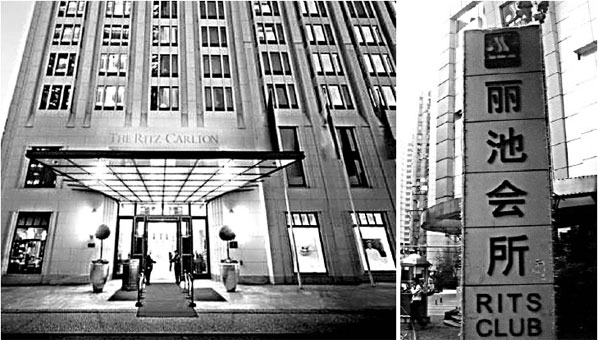


SHANGHAI: After years of fighting, Ritz Hotel has launched its final strike against the Rits spa, telling it to fold towels and get out of sight.
On April 7, the Britain-based Ritz told Shanghai's No 2 Intermediate People's Court in a hearing that Shanghai Huangpu Rits Club, which operates a sauna, spa, massage and hairdresser, has infringed its trademark.
"By using a name similar to the famous Ritz, Rits is obviously taking a free ride," says Meng Ting, Ritz's attorney.
Meng says that Ritz is the surname of the hotel founder and has a history of about 100 years. "It has accommodated celebrities including Princess Dianna and film star Marilyn Monroe," Meng says.
Rits has been causing confusion for 8 years, according to Meng.
"It uses the name in the business logo, decorations, sleepers and towels in its shops and causes confusion," he says.
"And the confusion has helped Rits to quickly expand."
Rits' parent company, based in Xiamen, Fujina province, started using Rits as early as 2000 and soon applied to the State Administration of Industry and Commerce Administration to register it as a trademark.
During the application proceeding, Ritz found out and proposed its objection. In 2005, the administration made a judgment that Rits is too similar to Ritz and decided not to register it a trademark.
However, while the war continued, Rits expanded its operations to three locations in Shanghai, one in Xiamen, and another in Huzhou, Zhejiang Province.
In 2007, Rits was named one of the best chain stores in the country.
Ritz says that Rits is stealing its fame and calls for it to stop. "Stop using Rits in business and compensate Ritz 300,000 yuan," the British hotel group demanded in a 2006 lawsuit.
But Rits says it does not infringe on Ritz's trademark.
"Ritz is not famous in China," Xu Yuhui, Rits' attorney told the court.
"In China, it always goes as Ritz-Carlton instead of Ritz alone. Plus, we provide different services and cater to different customers.
"There is no confusion. But Ritz has been standing in the way of Rits registering its trademark."
Xu says that the spa club uses "Rits" in its business logo together with the Chinese name and the English part isn't highlighted. "Chinese people will only notice the Chinese name when they see the club signboards," he says.
But Meng claimed that there is a growing number of well-educated Chinese who pay attention to English logos and there is also a large expat population in Shanghai.
"It will cause confusion among them," he says.
Both Ritz and Rits declined to mediate and demanded a fair judgment at the end of the two-hour hearing. A verdict will be announced on April 21.
Meng says he was confident of victory.
"Ritz has registered its trademark in more than 100 countries including China and built a network around the world to watch out for infringement," Meng says in an interview.
"It has succeeded in defending itself against trademark infringement in Poland, Japan and Croatia and is therefore recognized as a famous trademark in those places," Meng says.
A small hotel in Croatia obtained www.ritz-hotel.net as its web address and Ritz applied arbitration. World Intellectual Property Organization (WIPO) made a judgment in favor of Ritz.
In 1998, the group opened its first operation in China - the Portman Ritz-Carlton Shanghai. It now has 5 hotels in the country and plans to expand to 10 by 2010.
In 2005, a hotel, office and shopping complex in Xi'an, Shaanxi province, named Ritz-Oriental, was opened. After negotiations, it deleted Ritz from the name.
In 2006, a service apartment in Beijing named HQ Ritz Hotel was opened. Under the request of Ritz, Beijing's industry and commerce bureau ordered it to change the name.
"I believe Ritz will win again this time," Meng says.
As a lawyer specializing in IPR, Meng says that he is grateful to be in this specific field. "Almost every court has a specific department to try IPR cases and most judges who work in the department are well educated and work professionally," he says.
The country has promulgated enough laws to provide good IPR protection, but how they are enacted is different in different areas.
"Chinese IPR laws do not punish severely and some would rather violate and be punished," he says.
According to the law, when a plaintiff does not have evidences to prove losses from IPR violations, the highest amount of compensation it can receive is 500,000 yuan.
Meng makes about 400,000 yuan to 500,000 yuan for every litigation he is hired to work on. He says that normally it takes about three years to end a litigation.
"Ninety percent of my clients are foreign companies including Gucci, Yamaha and baby food producer Novatas," he says.
"Like many others in the field, I prefer to work for foreign clients."
Meng receives about 100,000 yuan from working for a domestic client.
"Chinese companies are less aware of IPR protection," he says.
"Although most Chinese companies have registered their own trademarks and have legal services, they are far from being careful enough."
Editor's note: The IPR Special is sponsored by the State Intellectual Property Office and published by China Business Weekly. To contact the Intellectual Property Office, the IPR Special hotlines are 8610-64995421 or 8610-64995826, and the e-mail address is ipr@chinadaily.com.cn.
(China Daily 04/21/2008 page9)













